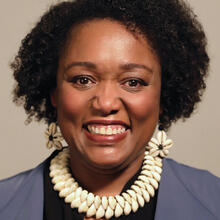When Cardinal Wilton Gregory of Washington, D.C., announced in March 2020 that the Mass would be closed to the public because of Covid-19, I was not angry. His concern for my physical health was prudent. He did not use spiritual bromides to lull us into believing our bodies are impervious to the effects of the world or tell us that defying public health orders in an effort to attend Mass is a true witness of our devotion to God.
The Mass was not cancelled and was still being celebrated by priests, even if the mode of participation by the laity changed. It was available online for those who wanted to watch it, and bishops issued dispensations so we incurred no sin by not attending in person. But some clergymen were angry with what they perceived as bending the knee to the state. They said public health was not within the purview of bishops, who should only care for our souls.
I was told I was fearful because I obeyed the bishop and followed lockdown directives, and that if I were a true believer I would be doing all I could to get to the Holy Mass.
I was told I was fearful because I obeyed the bishop and followed lockdown directives, and that if I were a true believer I would be doing all I could to get to the Holy Mass. To some, the pandemic was a demonic force that overtook the world with the express purpose of separating the people of God from the Eucharist. Obedience to our bishop and public health directives were thus evidence of our excessive fear. Reckless behavior was characterized as holy courage.
Still, I could not forget the desperate news from Italy in early 2020, which warned the world to take the virus seriously. Italians endured so many deaths and long lockdowns, but they grew creative in their isolation. They opened their windows and sang together, and some even played tennis between apartments. They craved contact with others but remained inside in order to protect others. Love your neighbor as yourself, Christ commanded. The pandemic certainly offered plenty of opportunity to do that.
Sadly, the fear of dwindling church donations and a downturn in the economy led some to suggest that the vulnerable should be on lockdown but the rest of us should be free to live as we had before the pandemic. Why should we be penalized for our good health or youth? Why should we suffer poverty or risk being poor? The inability to operate businesses as usual infuriated more people than I expected. Clergy and laypeople who normally defend the life of the weak among us, especially preborn children, were agitated that they might taste economic hardship because of lockdowns—lockdowns undertaken for the common good.
How could we complain about sacrifice undertaken for the common good, for the love of neighbor, for the protection of the vulnerable?
We who enjoin women in crisis pregnancies to voluntarily accept poverty, to jettison their previous lifestyle and to forgo whatever interferes with mothering for the sake of their child’s life did not heed our own advice. How could we complain about sacrifice undertaken for the common good, for the love of neighbor, for the protection of the vulnerable?
The pandemic lifted up a mirror, and what was reflected back was not the image of a loving God but craven, self-centered humanity. As soon as we were given a chance to kiss the mantle of poverty and self-sacrifice, we rebelled. As soon as we were offered the cross, we ran.
More than anything, this pandemic should push American Catholics to recall what we believe about the human person and the defense of human life. Let us recall Christ’s example of sacrifice. Let us recall the suffering of the holy martyrs. We may not suffer as the martyrs did, but we can witness to our faith by embracing the restrictions of the pandemic for the love of God and neighbor. Let us not just be preachers or hearers of the word, but doers of the word. The message we Catholics give to those who are considering choosing death for their preborn children should be the message we heed in our own lives. Choose life! Our neighbors’ lives are worthy of protection too.









